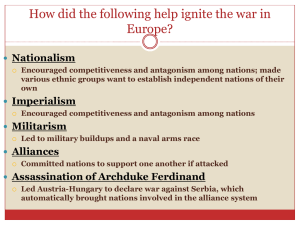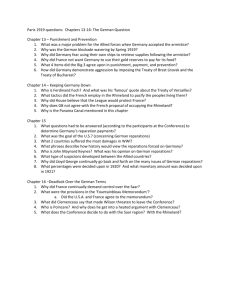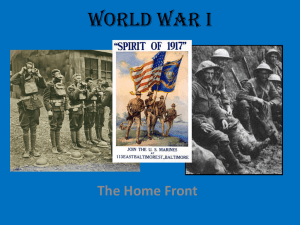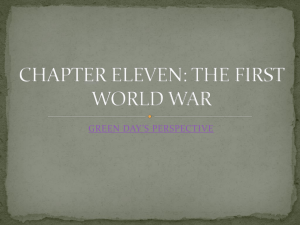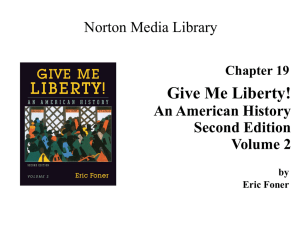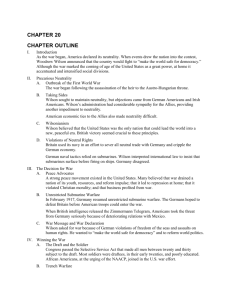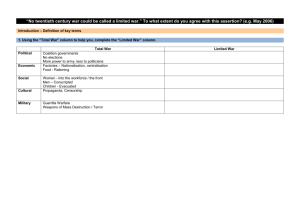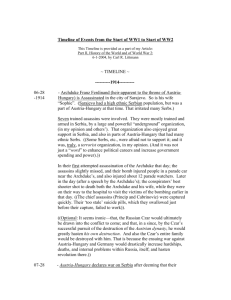Unit 4 Vocab: Define the following terms in your notebook. Due
advertisement
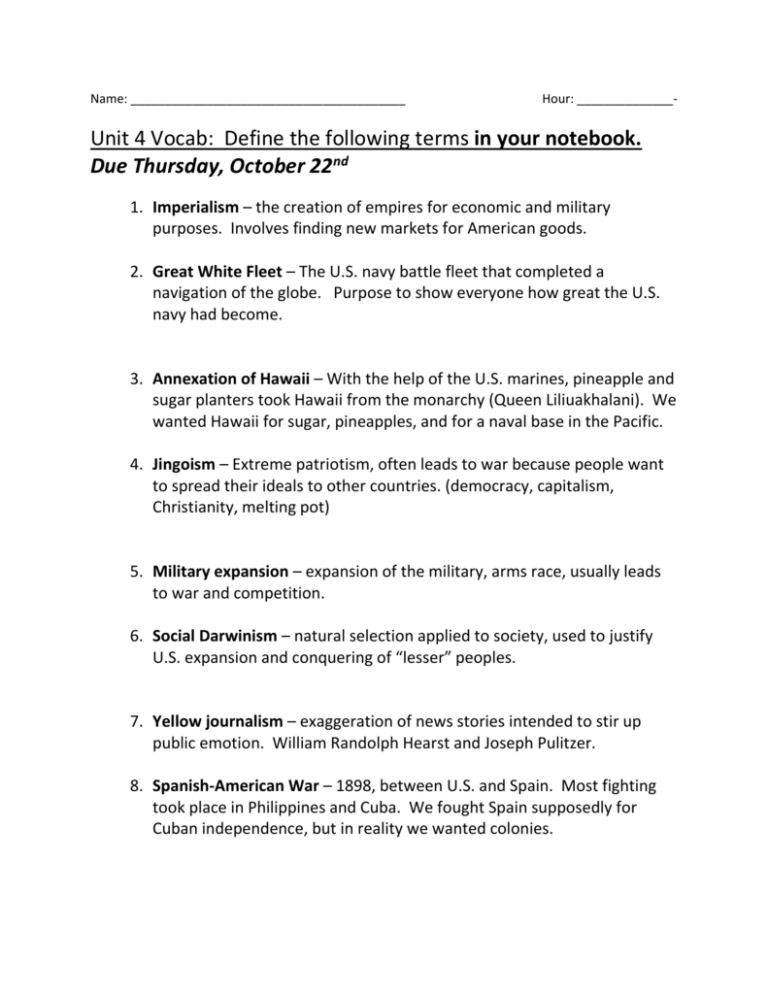
Name: ________________________________________ Hour: ______________- Unit 4 Vocab: Define the following terms in your notebook. Due Thursday, October 22nd 1. Imperialism – the creation of empires for economic and military purposes. Involves finding new markets for American goods. 2. Great White Fleet – The U.S. navy battle fleet that completed a navigation of the globe. Purpose to show everyone how great the U.S. navy had become. 3. Annexation of Hawaii – With the help of the U.S. marines, pineapple and sugar planters took Hawaii from the monarchy (Queen Liliuakhalani). We wanted Hawaii for sugar, pineapples, and for a naval base in the Pacific. 4. Jingoism – Extreme patriotism, often leads to war because people want to spread their ideals to other countries. (democracy, capitalism, Christianity, melting pot) 5. Military expansion – expansion of the military, arms race, usually leads to war and competition. 6. Social Darwinism – natural selection applied to society, used to justify U.S. expansion and conquering of “lesser” peoples. 7. Yellow journalism – exaggeration of news stories intended to stir up public emotion. William Randolph Hearst and Joseph Pulitzer. 8. Spanish-American War – 1898, between U.S. and Spain. Most fighting took place in Philippines and Cuba. We fought Spain supposedly for Cuban independence, but in reality we wanted colonies. 9. Territories acquired by the U.S. from the Spanish-American War – Guam, Puerto Rico, Philippines, some control over Cuba Platt Amendment – placed in Cuba’s constitution, basically did not let Cuba do anything without the U.S.’s consent. 10. Panama Canal – eased movement between Atlantic and Pacific ports. You no longer had to go all the way around South America to get from the west coast of the U.S. to the east coast and vice versa. Also useful for military purposes. 11. Anti-Imperialist League – group of Americans who tried to battle American expansion because they believed that imperialism rejected the American ideal of “liberty or all”. Kind of a contradiction to say “all men are created equal” yet we conquer everyone who is not us. 12. Open Door Policy – directed towards China. Basically, U.S. should have equal access to trade with China. Other powers needed to share influence in China. China used to buy a lot of American goods. Opposite is true today. 13. Roosevelt Corollary to the Monroe Doctrine – Reaffirmation that the U.S. would use its navy to keep European powers out of the Western Hemisphere. Roosevelt said that we will intervene in Latin America “whenever necessary” 14. Big Stick diplomacy – “speak softly and carry a big stick” – translation: try to negotiate first but prepared to use force, back up what you say. 15. Dollar diplomacy – Taft’s policy, using foreign investment as a tool for good relations with other countries. 16. Moral diplomacy – interfering in other countries with similar moral beliefs, using humanitarian concerns above all others. 17. Banana republics – Central American countries dominated by the U.S. Fruit Company. Sanford B. Dole. Basically, these countries were controlled and their constitutions written by private businesses. 18. Boxer Rebellion – Chinese nationalists try to expel foreign interests. They are crushed. Westerners maintain a strong foothold in China. 19. Philippines Insurrection – we guaranteed Filipino independence from Spain, yet we turn around and try to make the Philippines an American colony. They rebel, we fight a 3 year war where we lose 7k troops, they lose 17k and 200k civilians. We maintain control. 20. Mexican Revolution and Pancho Villa – Mexican raider who crossed the border and killed a handful of Americans. Wilson sends John J. “Blackjack” Pershing to pursue Villa, he is never apprehended. 21. Alliances - the defensive alliances of World War I led to war because, “an attack on one, is an attack on all.” Though intended to promote peace and security, alliances helped cause the war. 22. Assassination of Archduke Franz Ferdinand – spark that ignited World War I. killed by a Serbian nationalist by the name of Gavrilo Princip. 23. Nationalism – intense pride in one’s country. Belief that your country has superior cultural characteristics such as superior religion, superior race, superior economic system. Also causes people without a country to push for one. 24. Militarism – belief that the military should the of primary importance. Germany is an example of a militaristic state. Leads to war because other countries will not sit idly by while countries militarily expand. 25. Unrestricted submarine warfare – German U-boats sink not only military targets but civilian ones as well. They sink passenger ships and any ships suspected of carrying military supplies. Violation of international maritime law. 26. Sinking of the Lusitania – German u-boat torpedoes a British passenger liner in 1915, America still remains neutral despite 128 Americans dead. 27. Sussex Pledge – Germany promises not to torpedo any non-merchant ships. It pledges to restrain from unrestricted submarine warfare. 28. Zimmerman Telegram – German ambassador sends a letter to the Mexican government, saying if war breaks out between Germany and U.S., Mexico will invade from the South and Germany will reward Mexico with AZ, NM, TX, and maybe CA 29. Great Migration – movement of 6 million Africans from the South to the North, East, and Midwest. Life sucks in the South for AA’s, racial discrimination. Find jobs, escape violence, create better lives for their children 30. Victory Gardens – government encouraged people to plant their own gardens to eat their own food so they could send more food to the troops overseas. 31. Liberty bonds – government bonds sold during the war 32. Propaganda posters during WW1 – persuaded people to enlist, ration, grow victory gardens, buy government bonds, keep their mouths shut, women to get jobs, 33. Committee on Public Information-independent agency of the government of the United States, designed to create propaganda and control the media during WW1 34. Selective Service Act- to build up a military, enlists young men to be drafted to serve in the military. 18-35 years old. 35. Espionage Act of 1917- made to root out suspected spies, thought they were communists. Illegal to criticize the government. An act to punish espionage within the United States. Can’t encourage people to resist the draft or say that you support the opposing nation. Schenk v. United States 36. War Industries Board – government agency designed to oversee war production, told factories what to produce and how much of it to produce. Reorganization of civilian factories to build military products 37. Voluntary policies of the Food Administration – Herbert Hoover initiated Wheatless Wednesdays, Porkless Fridays, rationing, encouraged people plant victory gardens. 38. Sedition Act of 1918 – no talking bad about the war, the government, the president etc. suppression of free speech. Eugene Debs will get 20 years in prison for encouraging people to draft dodge. 39. Schenk v. United States – Schenk was encouraging resistance the draft, government imprisons him under the Sedition Act. He sues, saying that freedom of speech should protect his right to protest. The Supreme Court upheld the Sedition Act, saying that in times of war, suppression of free speech is justified. 40. New weapons of WW1 – poison gas, trench warfare, machine guns, submarines, tanks… high body count, millions die, leads to a long, protracted war with losses on both sides. 41. Trench warfare – defensive positions, very little ground gained, stalemate, terrible conditions. 42. Bolshevik Revolution – 1917 the Russians will undergo a Communist revolution. They will pull out of the war, leaving the Germans to focus all of their power on France. Lenin, Trotsky, and Stalin 43. General John “Blackjack” Pershing – U.S. general during WW1, led the American Expeditionary Force, controlled all U.S. forces during the war. 44. American Expeditionary Force – American troops, about 1 million sent to help out the French and the British on the front lines. Less than 1% of shots fired in WWI came from American rifles 45. Big Four at Versailles – Lloyd George, Clemenceau, Orlando, and Woodrow Wilson, the leaders of the big four powers in post-WW1 world. They decide the terms of the Treaty of Versailles. Clemenceau, the prime minister of France, wants harsh punishments for Germany. Wilson objects to this but is overruled. 46. Wilson’s Fourteen Points – freedom of the seas, open agreements openly arrived at, self determination – Wilson’s plan for peace after the war. 47. League of Nations – international peacekeeping community, precursor to the United Nations. U.S. doesn’t even join. Germany and Russia also do not join. Not very powerful, because you need those three. 48. Self-determination – allowing nations to determine for themselves what territory and type of government, economy, religion, culture, etc. they will have 49. Reparations – amends for a wrongdoing by paying money to or helping those who have been wronged. Germany is forced to pay billions of war reparations to France and other countries. 50. War guilt clause – leading cause of World War II because it blames Germany for starting the war. Germany is forced to pay an outrageous amount of war reparations that they cannot afford. Paves the way for someone like Adolf Hitler to come to power and promise the Germans escape from economic depression; he promises to restore German pride and create a new German empire (REICH)

